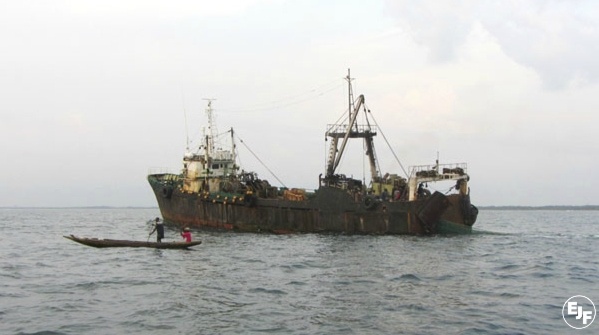
EU Fisheries Commissioner bans three countries from exporting fish to the EU and formally warns Korea
As a result of the failure “to address structural problems” and “show real commitment to tackling the problem of illegal fishing” the Commissioner identified Guinea, Cambodia and Belize as “non-cooperating third countries.” Three further countries, including Korea, will be formally warned to improve their performance or face similar “red cards” from the Commission.
At today’s midday press briefing, the Commissioner recommended that the European Council approves an EU-wide ban on all fisheries products caught by vessels flagged to Guinea, Cambodia and Belize, as well as a ban on EU vessels fishing in those countries’ waters. The ban represents an unprecedented move to punish countries for failing to act on pirate fishing, and will come into effect after it is approved by the Council.
Commissioner Damanaki said that the decision demonstrates the EU's "commitment to tackling illegal fishing". She said: "The EU market is negatively affected as are local and EU fishermen. We continue to put pressure on the countries which are fuelling the supply chain of illegal fishing be it as a coastal State, flag State, or Flag of Convenience."
In a demonstration of forceful action by the EU to address pirate fishing, the Commissioner also handed out formal warnings - so called “yellow cards” - to Korea, Curaçao and Ghana, who are failing to “keep up with international obligations to fight illegal fishing.” These countries could also be banned from exporting to the EU, if they do not take steps to improve their performance, excluding them from the world’s largest market for fish. During the press briefing, the Commissioner highlighted that €75 million of fish from Korea, and €130 million of fish from Ghana are imported into the EU each year.
The European Commission’s actions, which are part of the EU IUU Regulation (Council Regulation (EC) No 1005/2008), are aimed at deterring pirate fishing operations by denying them access to the world’s most valuable seafood market. The legislation, introduced in 2010, allows fish to be seized in European ports, poor performing flag States and illegal vessels to be sanctioned, and coastal States to be encouraged to protect their marine resources.
Steve Trent, EJF Executive Director, welcomed the Commission's action, saying it represented "much needed leadership on a global scale to combat pirate fishing operations". Mr Trent added that "the denial of access to the world’s most valuable seafood market sends an unequivocal message to pirate fishing operators that the EU will leverage its unique legislation to prevent their willful and illegal actions that are damaging marine environments, depleting fish stocks, undermining legitimate operators and destroying the livelihoods of many poor coastal communities".
Since 2010, EJF has been operating a community surveillance project in West Africa, working with fishing communities to gather information about pirate fishing and share it with decision makers. Using satellite based technology, EJF has tracked illegally-caught fishing to the EU market and launched “IUU Alerts” that call on EU authorities to act. Investigations as a result of evidence gathered through the project have led to millions of dollars in fines, and a major reduction in inshore illegal fishing in some areas.
EJF’s project has documented pirate fishing by a number of nations, but the illegal activities of Korean vessels have been particularly widespread. Since 2010, EJF has documented over 200 reports of pirate fishing by Korean vessels that target high-value fish species in the waters of some of the world’s poorest countries in West Africa. EJF has documented Korean pirate fishing vessels fishing in protected areas, fleeing fisheries patrols, refusing to pay fines, covering their identification markings, transhipping fish illegally at sea, and attacking local fishers. EJF has also documented human rights abuses onboard Korean pirate fishing vessels, with workers as young as 14 forced to live and work in deplorable conditions during fishing trips of up to three months.
SIGN UP FOR OUR EMAILS AND STAY UP TO DATE WITH EJF